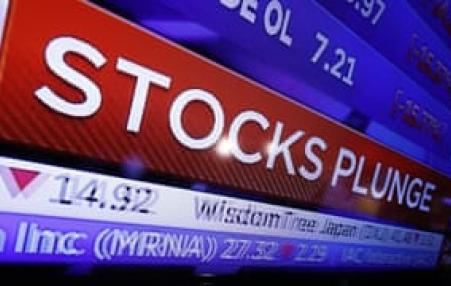The Coronavirus Crash Could Be Worse Than The Republican Great Depression Of 1930
by Thom Hartmann | Mar 27, 2020 | Blog, Democracy, Economy, Featured | 0 comments

How Covid -19 slows the economy
Coronavirus is not only a public health crisis, it is also a shock to the global economy. Working people must demand that government act, or we and our families will pay the price for others’ lack of action, as we so often have in the past.
|

,
|
The stock market fell 7% at the open Monday morning. That may not sound like a lot, but it’s a catastrophic collapse—a financial crisis type number. Typically, the market might gain or lose in a whole year the value that was lost by the time the sound of the opening bell faded.
The collapse appears to be the result of a combination of the spread of coronavirus and falling oil prices—two events that are themselves connected. But it needs to be interpreted as an alarm bell, because we are dealing with the threat of two deadly kinds of contagions—one biological and the other economic and financial—both of which pose serious but manageable threats to the well-being of working people.
We have heard a lot about biological contagion and how to stop the spread of coronavirus in our workplaces and our communities. You can get up-to-date information on workplace safety and coronavirus at www.aflcio.org/covid-19 and at the websites of our affiliated unions. But what about financial and economic contagion? This is something elected leaders, economic policymakers and financial regulators must take action to stop.
How does it work? Coronavirus is a shock to the global economy. It stops economic activity of all kinds—shutting down factories, canceling meetings, sending cruise ships into quarantine. The only way to prevent that is to stop the spread of the virus (see above). The consequence of economic activity slowing down or stopping is that businesses lose revenue, and generally with loss of revenue comes loss of profits.
People who trade on the stock market usually price stocks by making projections about the future profits of the companies whose stocks trade on the public markets. The stock market reacts instantaneously to changing expectations about what may happen in the economy and to specific businesses. The stock market itself doesn’t create or destroy jobs, but it does contribute to the overall financial health of companies and of people. When stock prices fall rapidly, they can create their own kind of contagion—exposing fragile financing structures for both companies and people. That can in turn lead to retreat—companies pulling back on investments or, in the worst case, going bankrupt.
So the stock market can create contagion all by itself. But the much more serious kind of contagion has to do with corporate debt. We have had low interest rates for years, and businesses around the world have gone on a borrowing spree. This spree has been one of the causes of relatively healthy economic growth in the last few years, but it has also led to businesses carrying a lot of debt relative to their earnings and growth.
Here is where the danger gets very real, because, as we all know, if you borrow money, you have to make payments on that debt. What if businesses that have borrowed a lot of money suddenly don’t have anywhere near the revenue they expected to have? This is what empty planes and blocked supply chains mean.
|
 |
| Korea |
Liberal
|
Center
|
Conservative
| |
Keynes
|
Neo Classical
|
Neo Classical
| |
Social Democracy
|
Neoliberalism
|
Neoliberalism
| |
Corporate
Liberalism
|
Market Fundamentalism
| ||
Bernie Sanders
|
Elizabeth Warren
|
Obama/ Clinton
Biden/ Bloomberg
|
Bush /Trump
|
Naomi Klein
|
PaulKrugman
Robert Reich
Joseph Stiglitz |
Bernanke
Paulson
|
Paul Ryan
Steve Mnuchin
Larry Kudlow
Peter Navarro
|